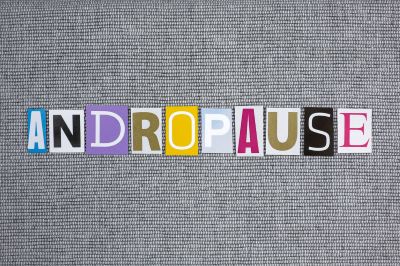As men get older, they go through a similar condition to menopause known as andropause or “male menopause.”
Everyone is familiar with “menopause,” the so-called “change of life” that women go through once they exit their childbearing years and their hormone levels drop significantly.
But did you know that men also lose critical hormones as they age, and they too go through a very similar condition as menopause, known as “andropause?”
How Common Is Andropause?
The primary driving force of male menopause or andropause is low testosterone. In fact, while loss of other hormones such as human growth hormone can contribute to andropause, the terms, “andropause,” “low testosterone,” and “hypogonadism” are often used interchangeably to describe age-related testosterone deficiency.
That having been said, low testosterone affects almost 40% of men aged 45 and older.
What Causes Andropause?
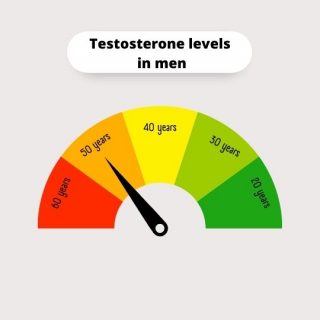 The primary cause of male menopause is age-related testosterone loss. Unlike menopause in women, which occurs at a specific point in time, after her last menstrual period, andropause in men occurs more slowly over time. Menopause in women is caused mainly by the depletion of estrogen. Andropause is caused by the slow decrease in testosterone that occurs as a man ages.
The primary cause of male menopause is age-related testosterone loss. Unlike menopause in women, which occurs at a specific point in time, after her last menstrual period, andropause in men occurs more slowly over time. Menopause in women is caused mainly by the depletion of estrogen. Andropause is caused by the slow decrease in testosterone that occurs as a man ages.
Decreasing levels of human growth hormone also contribute to andropause; however, its driving force is age-related testosterone decline. Testosterone is the most important androgen or male hormone. Testosterone levels peak in men at around the age of 20. After that, the testosterone level in the blood slowly drops. By the time a man is in his 60s, his testosterone level could be HALF of what it was in his 20s!
Most of the symptoms of andropause are related to low testosterone. However, recent studies have found that in aging males who suffer low testosterone, some of their remaining testosterone converts to estrogen. The research suggests that it could be this conversion of testosterone to estrogen that might be responsible for some of the symptoms of male menopause – particularly those related to sexual wellness.
What Are the Signs and Symptoms of Andropause?
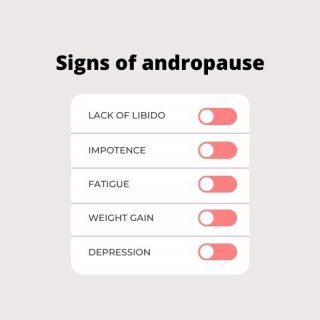 Most men between the ages of 35 and 65 will feel the symptoms of andropause. The signs of andropause, also known as “male menopause,” include:
Most men between the ages of 35 and 65 will feel the symptoms of andropause. The signs of andropause, also known as “male menopause,” include:
- Lack of libido and erectile dysfunction
- Fatigue/lack of energy
- Weight gain, particularly belly fat
- Loss of ability to build muscle, even when working out
- Depression, anxiety
- Mood swings, memory loss, and other cognitive difficulties
However, most if not all of the symptoms of andropause can be treated with hormone replacement therapy for men.
How is Male Menopause Diagnosed?
Andropause or low testosterone is determined by a simple blood test. The normal range is 300 ng/dL to 1,000 ng/dL. However, what is normal for one man, can be low for another. This is why testosterone replacement therapy is prescribed on a very individualized basis. Testosterone levels do fluctuate throughout the day – they are highest in the morning, so your doctor will probably want to do the blood test in the morning.
If your levels of bioavailable testosterone are determined to be low for your weight and age, and if an evaluation of your presenting symptoms warrants it, you will be prescribed testosterone therapy.
How is Andropause Treated?
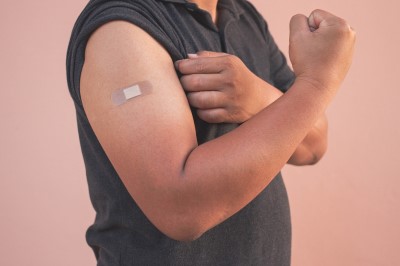 The only clinically proven treatment for andropause is hormone replacement therapy. Testosterone replacement therapy is the main treatment given for men suffering from andropause, but depending on your symptoms and lab tests, your doctor may also recommend growth hormone therapy.
The only clinically proven treatment for andropause is hormone replacement therapy. Testosterone replacement therapy is the main treatment given for men suffering from andropause, but depending on your symptoms and lab tests, your doctor may also recommend growth hormone therapy.
There are several forms of testosterone treatments. Low testosterone treatment can be given as topical gels and creams, subdermal pellets, Word, or testosterone injections. Our doctors have found testosterone injections to be the safest and most effective type of low testosterone treatment. Testosterone injections are prescribed as different “esters.” Each “ester” is simply a different chemical form of testosterone. They differ only in their molecular structure. The most commonly prescribed esters used for the treatment of low testosterone are testosterone enanthate and testosterone cypionate.
The before and after results of testosterone replacement therapy for the treatment of andropause have been well documented and can be life-changing for men diagnosed with low testosterone.
As with any therapy or medication, your individual results of testosterone therapy will vary. However, when prescribed for low testosterone and taken as long as you follow your doctor’s instructions, most patients achieve remarkable results on testosterone therapy.
There have been enumerable studies both in the US and abroad that have clinically proven the many positive benefits of testosterone therapy as an andropause treatment for men.
In treating andropause, the goal of testosterone replacement therapy is to prescribe you with the minimal dosage of testosterone that will be sufficient to restore the testosterone level in your blood to normal levels. Dosages of testosterone replacement therapy are titrated, which means that your doctor will start your testosterone replacement at the lowest effective dose. Once treatment is underway, your doctor will closely monitor your symptoms and your testosterone levels and may need to adjust your dose accordingly.
Just How Effective is Testosterone Therapy for the Treatment of Andropause?
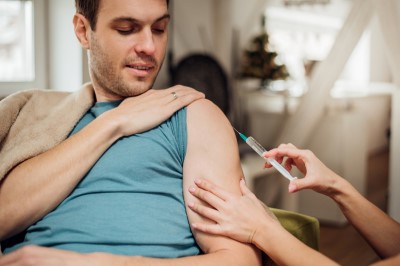 Recently, researchers from the prestigious Perelman School of Medicine at the University of Pennsylvania, in association with a dozen other well-respected medical centers nationwide, conducted seven clinical trials in partnership with the National Institute on Aging to determine the value of testosterone replacement therapy for aging men. A recent landmark collective study known as the “Testosterone Trials” (TTrials) concluded that “The trials showed an improvement in all the aspects of sexual function and overall mood.”
Recently, researchers from the prestigious Perelman School of Medicine at the University of Pennsylvania, in association with a dozen other well-respected medical centers nationwide, conducted seven clinical trials in partnership with the National Institute on Aging to determine the value of testosterone replacement therapy for aging men. A recent landmark collective study known as the “Testosterone Trials” (TTrials) concluded that “The trials showed an improvement in all the aspects of sexual function and overall mood.”
The TTrials were a coordinated set of seven placebo-controlled, double-blind trials in 788 men with a mean age of 72 years, designed to determine the efficacy of increasing the testosterone levels of older men with low testosterone through the use of testosterone replacement therapies.
The findings of the Testosterone Trials were published in March of 2018. The key takeaways from the TTrials were that for men suffering from andropause, testosterone treatment for one year:
- Improved all aspects of sexual function
- Improved strength and mobility
- Improved mood and depressive symptoms
- Markedly increased bone mineral density and estimated bone strength.
Frequently Asked Questions About Andropause
Can you treat andropause with OTC drugs?
No, not really. While some of the symptoms of andropause or male menopause might be alleviated by some over-the-counter medications, the root cause of andropause is hormonal, an imbalance of testosterone, human growth hormone, or both. The only clinically proven treatment for andropause is hormone replacement therapy.
What is the difference between menopause and andropause?
Menopause and andropause are related in that both conditions occur due to age-related hormone loss. However, they differ in the timing of the onset. Menopause in women occurs at a pre-determined point in all women – once she has experienced her last normal menses. Andropause, on the other hand, is a slow process that occurs over time as men between the ages of 35 and 65 gradually lose testosterone. The symptoms of andropause start to occur any time over that age range and will gradually get worse unless an intervention such as hormone replacement therapy is taken.
Does andropause cause infertility?
The root cause of andropause is low levels of testosterone and human growth hormone, HGH. Both testosterone and HGH are vital to healthy sperm, so in that way, yes, andropause can impact fertility.

